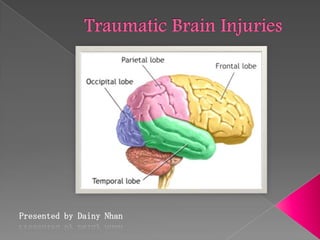
Traumatic Brain Injuries
- 1. Presented by Dainy Nhan
- 2. Traumatic brain injury (TBI) is a complex injury with a broad spectrum of symptoms and disabilities.
- 3. Highest causes of brain injury: Open head Injury, Closed Head Injury, Chemical/Toxic, Hypoxia, Tumors, Infections and Stroke
- 4. Nausea (Vomiting) Unconsciousness Slurred Speech (Speech and language deficits) Confusion (Vacant staring) Amnesia or other memory problems Delayed physical or mental responses Visual disturbances Difficulty with logic, thinking and reasoning
- 5. Slower to respond, react and complete activities and tasks Difficulty focusing attention Physical limitations Inappropriate social behaviors Difficulty remembering Frequently puzzled or challenged by grade level work Difficulty learning
- 6. Seizures coma impaired behavior and thinking death
- 7. Medical interventions surgery, long-term hospitalization therapies › physical › counseling › behavioral › occupational › speech
